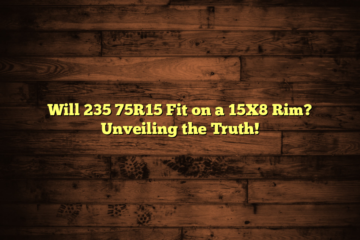What Wheels Fit Nissan Frontier?
Choosing the right wheels for a Nissan Frontier involves careful consideration of factors like bolt pattern, wheel size, offset, and tire compatibility. The most common bolt pattern for a Nissan Frontier is 6×114.3mm, but it’s essential to verify these specifications based on the specific model year and trim of your Frontier.
Introduction
Selecting the appropriate wheels for your Nissan Frontier is crucial for maintaining its performance, safety, and aesthetic appeal. The right wheels not only complement the vehicle’s appearance but also contribute to its handling, fuel efficiency, and overall driving experience. This comprehensive guide is designed to help Nissan Frontier owners understand the intricacies of wheel compatibility, focusing on essential aspects such as bolt patterns, rim sizes, offsets, and tire fitment.
The Nissan Frontier, known for its reliability and off-road capability, requires wheels that meet specific criteria to ensure the vehicle operates at its best. Whether upgrading for style or replacing worn wheels, understanding these requirements is key to making the right choice for your Frontier.
Key Takeaways
- Bolt Pattern: Nissan Frontier typically uses a 6×114.3mm bolt pattern, critical for wheel compatibility.
- Wheel Size: Common wheel sizes for the Frontier range from 15 to 18 inches in diameter, depending on the model and year.
- Offset: The correct wheel offset is necessary to avoid interference with the vehicle’s suspension or bodywork.
- Tire Compatibility: It’s important to match the wheels with tires that fit the Frontier’s specifications for performance and safety.
- Material Choices: Wheels made from durable materials like alloy or steel can impact the truck’s handling and appearance.
- Design Preferences: The style of the wheels can significantly alter the look of your Nissan Frontier, with numerous designs available.
Understanding Bolt Patterns
The bolt pattern is a crucial aspect of wheel compatibility. For the Nissan Frontier, the standard is typically 6×114.3mm, but variations may exist based on model year and specific trims.
Measuring Bolt Patterns
To determine your Frontier’s bolt pattern, measure from the center of one lug to the outer edge of the lug directly across from it. This measurement is essential for ensuring the new wheels will fit your truck correctly.
Wheel Size Considerations
The size of the wheels you choose has a significant impact on the Frontier’s aesthetics and driving dynamics. While some owners prefer larger wheels for a more aggressive look, it’s important to consider how size changes might affect ride comfort and handling.
Effects on Driving Dynamics
Larger wheels can enhance the truck’s appearance and potentially improve handling but may also result in a stiffer ride. It’s essential to find a balance that suits your preferences and driving needs.
The Role of Wheel Offset
Offset is the distance from the wheel’s mounting surface to its centerline. The right offset ensures that the wheels fit within the wheel wells without rubbing against suspension or body components.
Choosing the Correct Offset
An incorrect offset can lead to issues such as improper wheel alignment or tire rubbing. It’s vital to choose wheels with an offset that matches the Frontier’s specifications.
Tire Compatibility
Ensuring your wheels are compatible with suitable tires for the Nissan Frontier is crucial for maintaining the vehicle’s performance and safety. Tire size and specifications should match those recommended for your specific Frontier model.
Importance of Proper Tire Selection
Selecting the right tires to match your new wheels affects the vehicle’s handling, fuel efficiency, and safety. It’s important to choose tires that complement the wheels and meet the Frontier’s performance requirements.
Materials and Construction
Wheels can be made from various materials, including steel and alloy. Alloy wheels, typically made from aluminum, offer a good balance of strength and weight, beneficial for handling and fuel efficiency.
Comparing Alloy and Steel Wheels
While alloy wheels are preferred for performance and aesthetics, steel wheels offer durability and are often more cost-effective, making them a suitable choice for rugged use.
Aesthetic Preferences
The design of the wheels can dramatically transform the look of your Nissan Frontier. With a wide range of styles available, you can choose wheels that reflect your personal taste and enhance the vehicle’s appearance.
Customization Options
Wheels offer various customization options, including finishes and colors, allowing you to personalize your Frontier to your liking.
Conclusion
Selecting suitable wheels for your Nissan Frontier requires understanding specific vehicle requirements, including bolt patterns, wheel sizes, offsets, and tire compatibility. By considering these factors, you can enhance your Frontier’s performance, safety, and appearance, ensuring a satisfying driving experience.
FAQ
Can I use larger wheels on my Nissan Frontier?
Yes, but ensure they are compatible with the vehicle’s specifications and don’t affect the suspension or bodywork.
How do I confirm my Frontier’s bolt pattern?
Check the vehicle’s manual or consult with a professional to ensure accuracy. The most common pattern for the Frontier is 6×114.3mm.
Will changing my wheels void my vehicle’s warranty?
It might, especially if the modifications lead to damage. Always review your warranty terms before making changes.
Which is better for the Frontier, alloy or steel wheels?
Alloy wheels are typically better for performance and aesthetics, while steel wheels might be preferable for their durability and cost-effectiveness.
How should wheel size influence my tire choice?
Your tire choice should match the wheel size and the Frontier’s recommended specifications to maintain performance and safety.
Can new wheels improve fuel efficiency?
Lighter wheels can potentially improve fuel efficiency by reducing unsprung weight, though the effect might be minimal.




